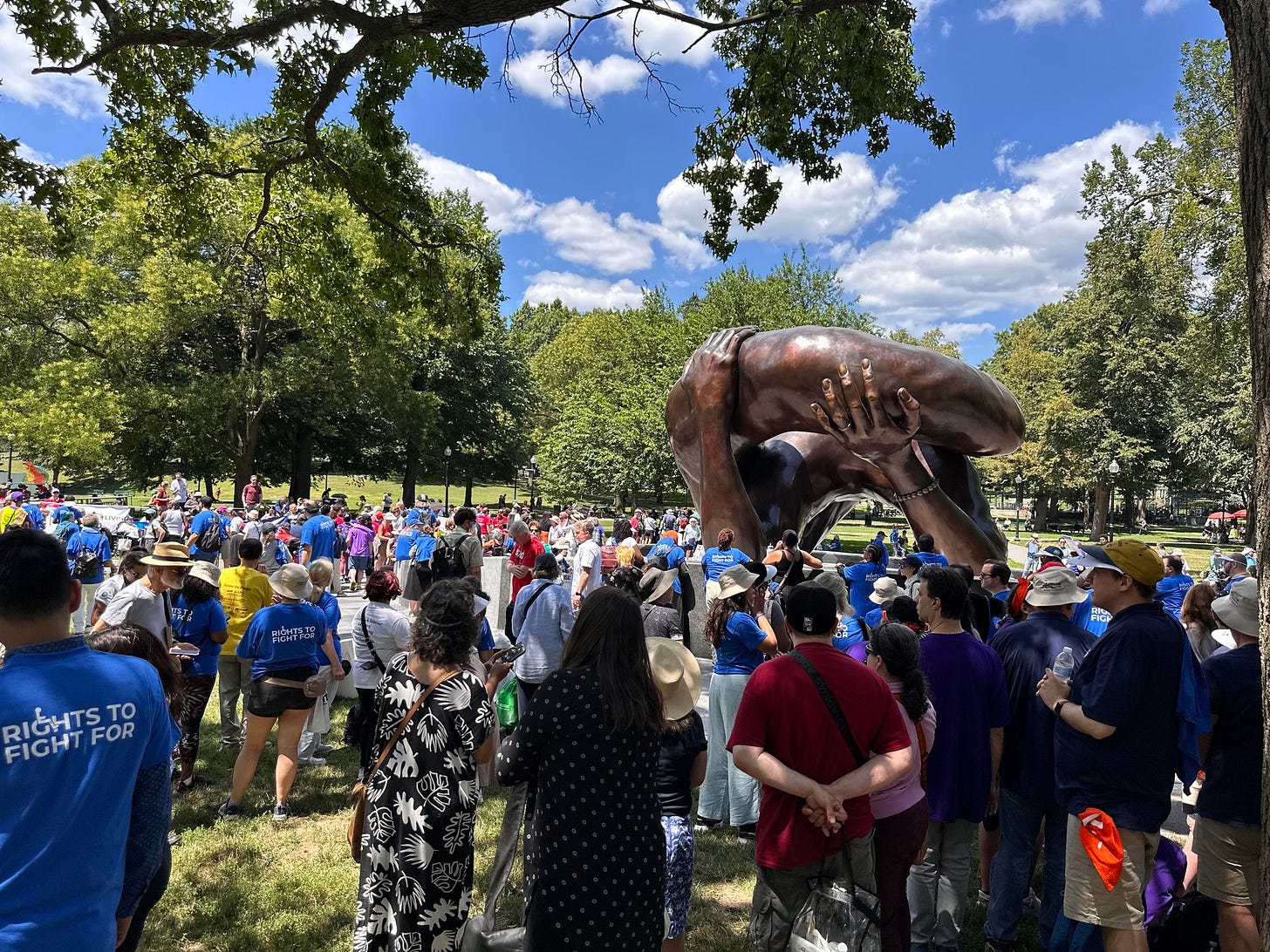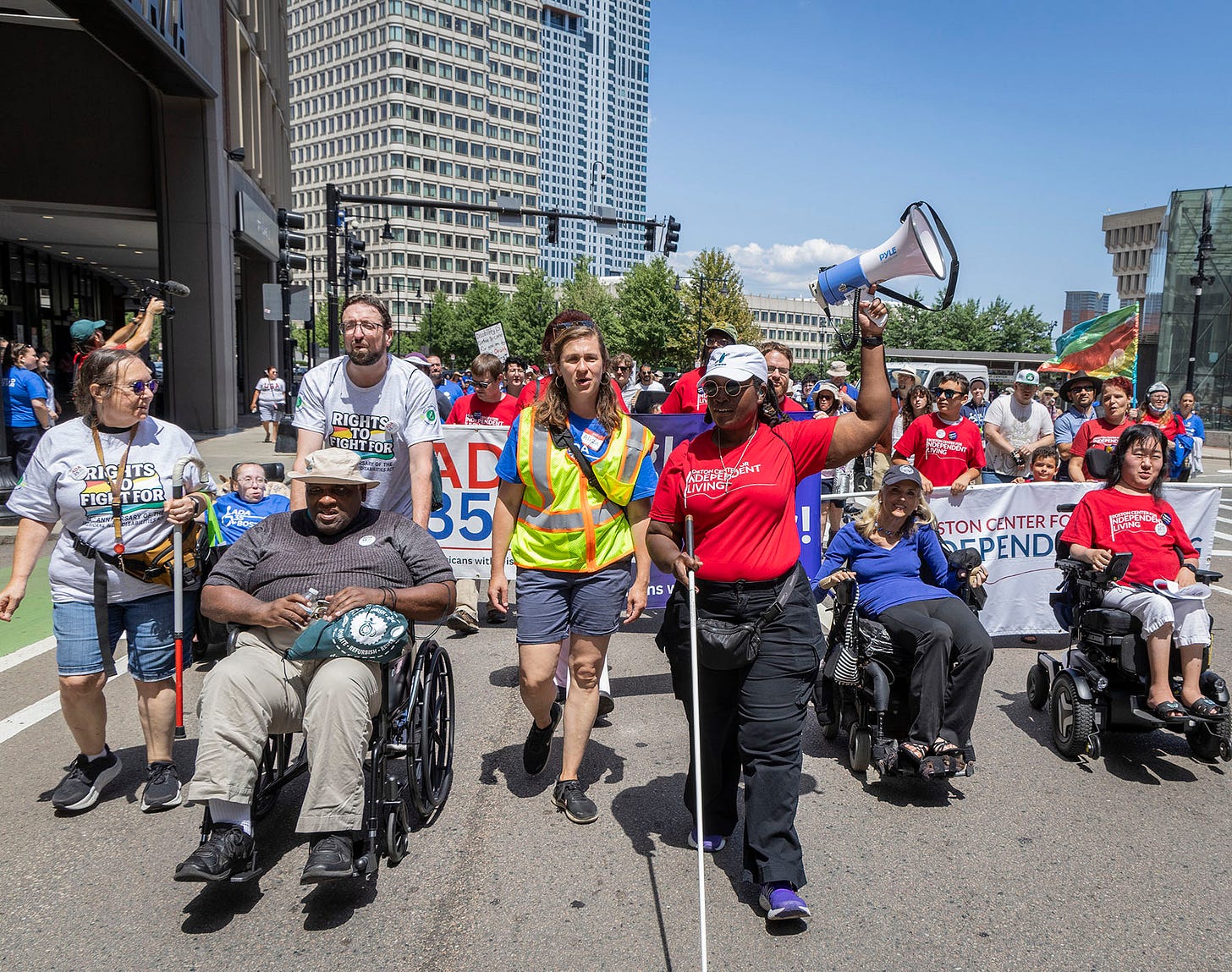On July 23, more than 1400 disabled people and our supporters gathered at Boston’s City Hall Plaza for a flag raising and then marched down Tremont Street to the Embrace, a powerful memorial to Dr. Martin Luther King and his wife Coretta Scott King on Boston Common, their arms wrapped around one another in infinite interconnectedness.
Disability Pride was the result of exceptional organizing by the Boston Center for Independent Living, the Boston Mayor’s Commission for Persons with Disabilities, and dozens of disability rights groups across Massachusetts.
Speakers included longtime leaders in our movements, from institutional survivor and transit accessibility leader Reggie Clark to activist, entrepeneur, and artist Keith Jones who reminded us that “under pressure we either break or become diamonds. You all are diamonds.”
I was proud to be able to put my skills to work on the tagline for this overwhelming show of disability activism in Boston—Rights to Fight For—and I was equally overwhelmed to see hundreds upon hundreds of people wearing shirts with the phrase emblazoned on them.
I wasn’t sure I would speak. My own disabilities have flared in recent weeks, my health has been up and down, and the thought of speaking in front of so many people came with the specter of making things worse.
But all morning I had the thought that we would finish our march between the Embrace and the Massachusetts State House, the state’s seat of political power, and a building where people with power, from Governor Maura Healey on, tell us each and every day that they are our allies. I felt that something needed to be said about these two things and what they tell me about the bad allies that disabled people are plagued with in Massachusetts and all over the nation—especially in positions of political power—and what we need to do to about it.
When I was offered the opportunity to close out Disability Pride for 2025 in Boston, I pressed the microphone to my chest so my shaking arm wouldn’t accidentally launch it into the air, tried to steady my phone in my other hand, and delivered the following remarks. I hope you’ll read and share them.

What Kind of Embrace?
This is a beautiful thing. This is a sight to be proud of, all of you, all of us together.
The question is, what do we do with this pride?
That’s where this Embrace means so much, especially at a time when we’re hearing a lot about threats to us from Washington D.C. and it’s clear that those folks don’t want to embrace us.
Our best defense against their hate is to build something better here in Massachusetts. But that means we have to ask about whether the people who hold power closer to home—people who claim they want to embrace us in this state—really mean it.
That’s because this is a moment where we need transformational change and transformational change cannot be segregated. It requires a wholesale commitment to dismantling an ableist society. For that to happen we need our allies to hold onto us as much as we hold onto them, and we need them to build up those muscles and move with us in new directions.
I am not convinced that they are prepared to do it.
All around us we have signs that many of the political leaders who claim allyship with us here at home in Massachusetts are not actually delivering on what transformational change looks like.
Otherwise why would we have state funds going to the torture—the electrical shocking—of disabled people that is done nowhere else in America?
Why would we have [John Lawn] a head of a state legislature’s health care committee arrested for drunk driving [last week] and still holding onto a position from which he is holding up a wheelchair repair bill?
Why would our leaders and our neighbors be so timid while those who come to care for us each day are systematically deported and those who remain have to fight for a living wage?
Why else would the state continue to cover up millions of pages of documents showing nearly two centuries of abuses against us so that it can continue to keep the doors of institutions that maim, torture, and kill us open?
This is not the embrace we need. This is an embrace that holds us back. And someone who holds us back that way, time and again, is not an ally. They are restraining us from making the transformational changes we have a right to demand:
A state where we are not thrown in institutions.
A state where our neighbors do not revile us and blame us for their problems.
A state where we can get an education alongside everyone else, not in segregated special education classrooms and restraint closets.
A state where we live equal lives in a world that does not resist every fiber of who we are because we don’t fit its definition of some unicorn called “normal.”
So how do we change that? We’re going to need to demand a better kind of embrace and that means showing up in the halls of power—in the State House, in town and city halls, in churches and synagogues and mosques, and on the streets—in front of people who say they are our allies as much as those who proudly proclaim they’re our enemies, and we need to force them to pay the tab on all those photo ops they’ve used us for whenever they want to give the impression that they’re committed to a transformational change that we have yet to see.
We must demand it, relentlessly, and not let go, yes, because we have no other choice, yes. But more importantly because they have no right to make us into a source of shame when we are proud of the fact that we need community to live, proud of the fact that we need a democracy to live, proud of the fact that we need the promises of this state and this nation to be fully realized to survive and thrive, proud to need the true and full embrace of this world, proud to demand it time and again until it is delivered, proud of who we are and damn right to be so.





